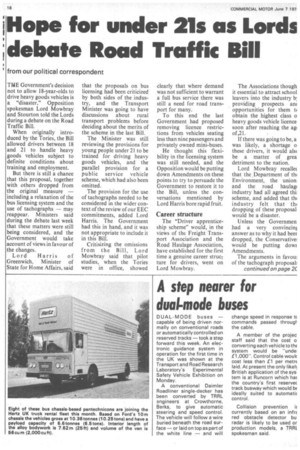Hope for under 21s as Lords debate Road Traffic Bill
Page 20

If you've noticed an error in this article please click here to report it so we can fix it.
from our political correspondent THE Government's decision not to allow 18-year-olds to drive heavy goods vehicles is a "disaster," Opposition spokesman Lord Mowbray and Stourton told the Lords during a debate on the Road Traffic Bill.
When originally introduced by the Tories, the Bill allowed drivers between 18 and 21 to handle heavy goods vehicles subject to definite conditions about training and employment.
But there is still a chance that this proposal, together with others dropped from the original measure — including a relaxation of the bus licensing system and the use of tachographs — may reappear. Ministers said during the debate last week that these matters were still being considered, and the Government would take account of views in favour of the changes.
Lord Harris of Greenwich, Minister of State for Home Affairs, said that the proposals on bus licensing had been criticized by both sides of the industry, and the Transport Minister was going to have discussions about rural transport problems before deciding about the merits of the scheme in the last Bill.
The Minister was still reviewing the provisions for young people under 21 to be trained for driving heavy goods vehicles, and the parallel provision for a public service vehicle scheme, which had also been omitted.
The provision for the use of tachographs needed to be considered in the wider context of the review of our EEC commitments, added Lord Harris. The Government had this in hand, and it was not appropriate to include it in this Bill.
Critisizing the omissions from the Bill, Lord Mowbray said that pilot studies, when the Tories were in office, showed clearly that where demand was not sufficient to warrant a full bus service there was still a need for road transport for many.
To this end the last Government had proposed removing licence restrictions from vehicles seating less than nine passengers and privately owned mini-buses.
He thought this flexibility in the licensing system was still needed, and the Opposition would be putting down Amendments on these points.to try to persuade the Government to restore it to the Bill, unless the conversations mentioned by Lord Harris bore rapid fruit.
Career structure
The "Driver apprenticeship scheme" would, in the views of the Freight Transport Association and the Road Haulage Association, have established for the first time a genuine career saw; ture for drivers, went on Lord Mowbray. The Associations though it essential to attract school leavers into the industry b: providing prospects ant opportunities for them tc obtain the highest class o heavy goods vehicle licence soon after reaching the agi of,21.
If there was going to be, a was likely, a shortage o these drivers, it would alst be a matter of grea detriment to the nation.
Lord Mowbray recallet that the ,Department of th( Environment, the union, and the road haulag industry had all agreed thi: scheme, and added that till industry felt that th( dropping of these proposal would be a disaster.
Unless the Governmen had a very convincini answer as to why it had beet dropped, the Conservative: would be putting dowt Amendments.
The arguments in favoui of the tachograph proposal: continued on page 2C




























































































































































